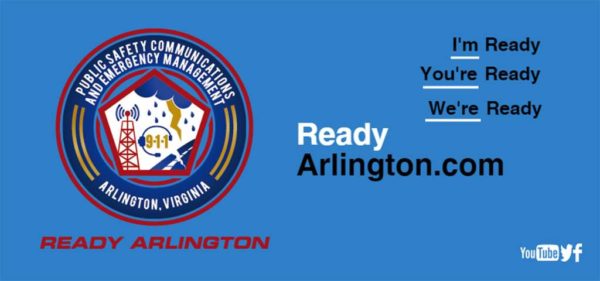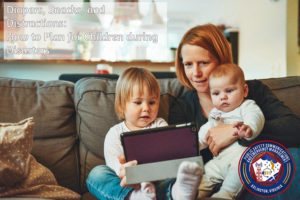This biweekly column is sponsored by the Arlington Department of Public Safety Communications & Emergency Management.
It’s no secret that kids change your life. From the time they are born, you plan differently: you start to schedule your errands and activities around naps, feedings, and bed time.
You carry a diaper bag because your kid needs special equipment: bottles, toys, diapers, and you gather kid-specific information: what diaper rash looks like and what kind of fever needs immediate medical attention. Your child creates “special considerations” for almost any situation, and that includes disaster planning.
Kids are affected by disasters differently than adults
Kids have unique needs during emergencies. They are almost entirely reliant on caregivers, and that means they’ll be looking to parents and guardians to react to what’s going on. That person will become responsible for responding to a child’s:
- Nutritional needs: Kids require more fluid than adults so keeping them hydrated is a priority. They can be picky eaters, so finding acceptable food items can be difficult. Although you may eat cold canned beans during a power outage, there’s no guarantee your child will.
- Physical needs: Children are smaller and less developed, and this puts them at greater risk for illness and injury during a disaster. For instance, they have thinner skin and take more breaths per minute, which means they get cooler faster and require more clothing to stay warm.
- Emotional needs: Children have limited coping skills and can be strongly affected by the emotional discord during a disaster. They will react to their caregiver’s stress. They need specialized support for healing and recovery.
Kids need special plans
During the day, 68 million children are separated from their parents, for the very normal reason of “work.” During a disaster, reuniting them with a caregiver is the first priority because that person will understand their child’s unique needs the best. Here’s what you can do to make sure you’re reunited with your child quickly:
- Know the contact information and emergency procedures for your child’s school or day care facility.
- Designate a meet up location if your family is separated (i.e., in the case of a house fire, we’re going to meet at Ms. Claire’s house across the street.)
- Identify which trusted neighbors and friends can pick up your child from their care facility in case you can’t get to them.
If you have kids, make sure you stock up on:
- Diapers, pull ups, and wipes
- Nursing supplies and/or formula
- Pre-packaged baby food, juice pouches and dry cereal snacks
- Fever reducers & Rash ointments
- A way to carry a non-walking child (stroller, harness, wrap, backpack, etc.)
- Activities, games, books, and toys
- Comfort items like stuffed animals and blankets.
What do kids need to know?
Talking to your children about disasters is difficult and can be scary. But don’t let fear get in the way of ensuring your child has the information he or she may need to help themselves during an emergency. You can spread out these conversations over time so your child doesn’t feel overwhelmed, but your child will feel safer knowing what actions they can take and that adults are ready to protect them. Make sure they know:
- Basic personal information (first name, last name, etc.) to identify themselves if they become separated from you.
- The phone number of a parent.
- How to dial 9-1-1.
- Where they can meet their family if the disaster effects their home.
- Who is allowed to pick them up from school or day care.
After Hurricane Katrina, it took six months to reunite the last child with her family. Taking these steps could help prevent that happening here.



